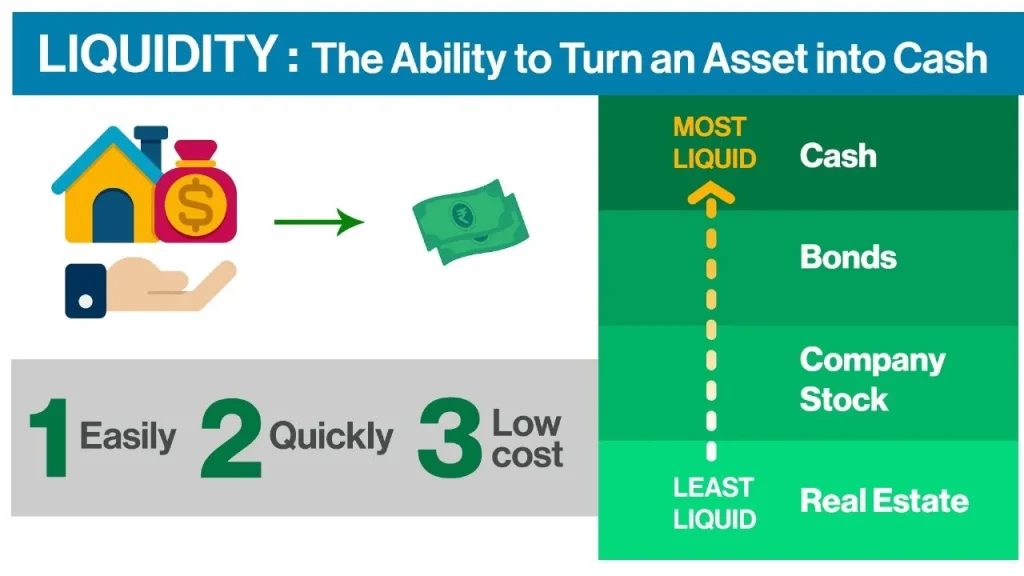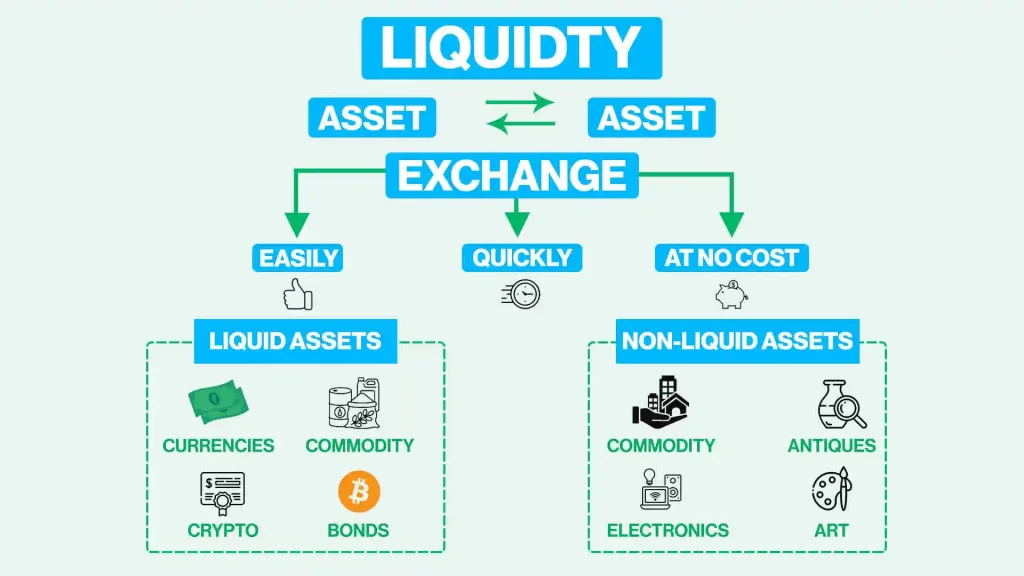Liquidity in finance describes the availability of liquid assets to a market or company, readily available for use as needed. Understanding liquidity is vital for assessing market conditions and optimizing investment strategies.
Let’s begin by understanding the concept of liquidity.
What is Liquidity?
Liquidity refers to how easily you can buy or sell something without causing big price changes. When there’s a balance between buyers and sellers, transactions happen smoothly. If there are more buyers, supply might run short, and if there are more sellers, demand might be low.
In simpler terms, Liquidity is how fast you can trade an asset at its true value. Cash is most liquid, while real estate is less liquid because finding a buyer or seller can take time.

What is liquidity in the stock market with example?
In the share market, liquidity refers to how easy it is to buy or sell stocks. When there are plenty of buyers and sellers, transactions happen smoothly, indicating strong liquidity.
For example, if it’s effortless to buy or sell stocks of a particular company on the stock market, it’s considered to have high liquidity. Conversely, the market becomes illiquid when there are too few participants, making trading difficult.
How does liquidity work in any stock?
Let’s think that a stock is hitting the lower circuit continuously, means there are sellers present in the stock but no buyers available. Again, if a stock hits the Upper Circuit consecutively, means there are buyers present in the stock but no sellers available.
In this scenario Liquidity is low in both stocks.
In case of Intraday Trading, trade should always be taken in stocks with high liquidity i.e. where a good number of buyers and sellers are present.
Read our blog for details about Upper Circuit and Lower Circuit.
Liquidity is also important in different types of Assets like Gold, Bond, FD (Fixed Deposit) etc. You can easily withdraw cash from Savings Bank Accounts which means it has enough Liquidity. On the other hand, FD (Fixed Deposit) is relatively less liquid than Savings Bank Accounts because in this case FD cannot be broken immediately or some charges could be deducted over time.
Again, in case of Physical Gold, Liquidity is relatively less because you have to go by yourself and sell the Asset whereas in Electronic Golds, we can sell it in the Open Market easily.

Types of Liquidity in Share Market :
Here are two main measures of liquidity: Market Liquidity and Accounting Liquidity.
1. Market Liquidity
Market liquidity refers to how easily assets can be bought and sold in a ma hnrket, like a stock exchange or real estate market, at predictable prices. In highly liquid markets, such as the stock market, bid and ask prices are close due to a high volume of transactions.
2. Accounting Liquidity
Accounting liquidity measures how easily a person or a company can pay their bills using readily available cash or assets. It shows how well they can handle debts and other financial obligations when they need to be paid.
Importance of Market Liquidity :
I. Trade Efficiency:
Liquidity ensures investors can buy or sell assets quickly and at a fair price.
II. Risk Management:
High liquidity allows investors to exit positions easily, reducing the risk of significant losses, especially during unfavorable market conditions.
III. Price Discovery:
In liquid markets, buyers and sellers can easily find counterparties willing to transact at desired prices, preventing overpaying or underselling of assets.
IV. Narrow Bid-Ask Spread:
Greater liquidity results in a narrower bid-ask spread, indicating less disparity between the highest price a buyer is willing to pay and the lowest price a seller is willing to accept.
V. Flexibility:
Liquidity provides investors with the flexibility to enter or exit positions without significantly impacting asset prices, enhancing overall market efficiency.
Which Financial Markets Are Most Liquid?
1. FX Market:
The foreign exchange (FX) market is the most liquid due to global participation from various entities such as banks, governments, and retail traders, making it easy to buy and sell currencies.
2. Large-cap Equities:
Large-cap stocks, representing companies with high market capitalization, are highly liquid as they are regularly traded on the stock market, enabling easy and fast transactions.
3. Commodities Market:
The commodities market, particularly with the expansion of derivatives trading, is highly liquid, with ample sellers and buyers in commodities futures and options trading.
Understanding market liquidity is crucial in trading. Before entering any market, assess its liquidity quickly and adjust your trading expectations accordingly.
Market liquidity refers to how easily assets can be bought or sold in a market.
Accounting liquidity measures how easily a person or company can pay their bills using available cash or assets, crucial for financial stability.
Liquidity is important in the share market as it ensures smooth transactions and price stability.
Factors affecting market liquidity include trading volume, market depth, and market participants’ behavior.
The most liquid financial markets include the FX market, large-cap equities, and the commodities market.
এই তথ্য শুধুমাত্র শিক্ষামূলক উদ্দেশ্যে প্রদান করা হয়েছে। একে কোনোভাবেই Investment Advice বা Recommendation হিসেবে গণ্য করা উচিত নয়। আমরা একটি SEBI-registered Organization, এবং আমাদের মূল লক্ষ্য হলো বিনিয়োগ সম্পর্কিত Concepts-এর সাধারণ জ্ঞান ও বোঝাপড়া বৃদ্ধি করা।
প্রত্যেক পাঠক/দর্শককে অনুরোধ করা হচ্ছে, যেকোনো Investment Decision নেওয়ার আগে নিজস্ব Research এবং Analysis করুন। Investment সর্বদা হওয়া উচিত ব্যক্তিগত Conviction-এর ভিত্তিতে, অন্যের মতামত থেকে নয়। অতএব, প্রদত্ত তথ্যের ওপর ভিত্তি করে নেওয়া কোনো ধরনের Investment Decision-এর জন্য আমরা কোনোভাবেই Liability বা Responsibility গ্রহণ করি না।



Leave a Reply